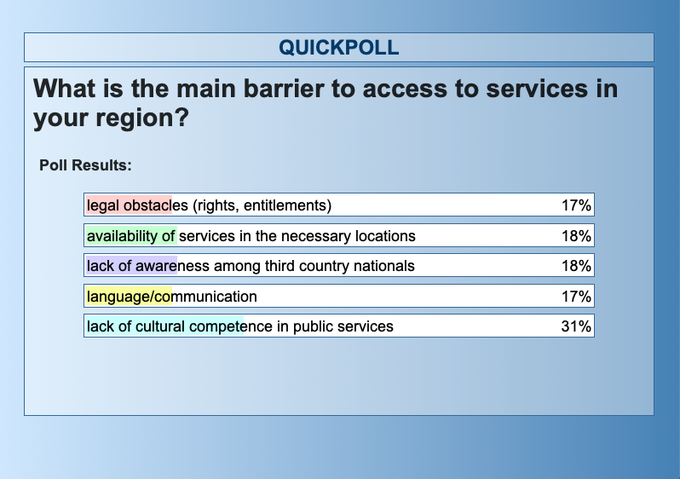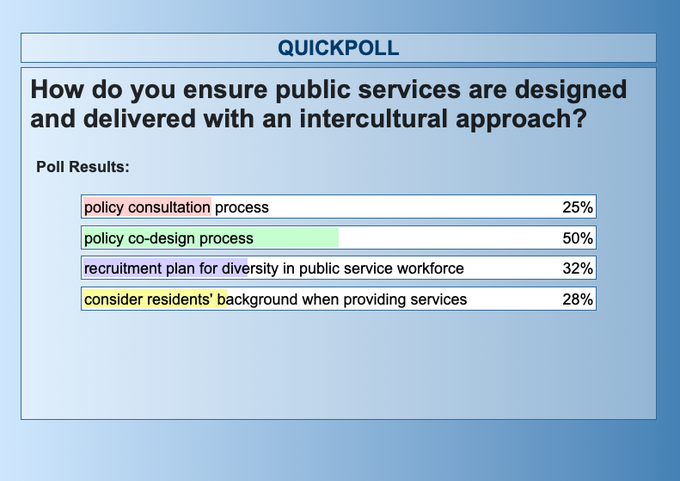News
Webinar: improving access to services
How intercultural approach helps to increase efficacy of public services by reducing cultural distances.

In the context of the first webinar “Intercultural regions: improving access to services”, speakers from the Intercultural Regions Network, The European Commission’s Directorate General for Migration and Home Affairs, IOM and the Council of Europe shared their experiences on how an intercultural approach helps to increase efficacy of public services by reducing cultural distances.
Acknowledging diversity
The discussion was launched by Oriol Amorós, Chair of the Intercultural Regions Network, and Secretary of Equality, Migration and Citizenship for the Government of Catalonia. He outlined the diversity of citizens in the European Union and the need for more cohesive societies. The intercultural approach, he explained, is a way to recognise the equality of rights and duties, to acknowledge and value diversity, and to foster interaction. To promote interculturalism helps developing more effective and more resilient systems. It is with this in mind that the Intercultural Regions Network was launched in 2019 based on the positive experience of the intercultural cities of the Council of Europe.
The network is open to any region committed to enforce the principles and objectives of the network. For further information, visit the Intercultural Regions Network page.
The role of the European Commission
Nuria Diez Guardia, Policy Officer, Directorate-General for Migration and Home Affairs then underlined the role of the European Commission, which is to provide incentives and to support all levels of governance to improve integration policies and practices.
She presented two particularly successful initiatives:
- The Urban Academy on Integration consisting of two days of peer to peer learning.
- The European Migrant Advisory Board including migrants and refugees themselves experts on immigration and asylum-related policies.
A need for cultural competences
Participants to the webinar provided insights on the barriers to access to services in their region. The lack of cultural competences in public services was clearly identified as a stumbling point.

Universal access to health services is in everybody’s interest
This need for cultural competences is particularly visible in the field of health. Dominik Zenner, Senior Migration Health Advisor at IOM Regional in Brussels, insisted on the fact that universal health coverage is part of the Sustainable Development Goals. He presented findings from research on the bidirectional relationship between migration and health as well as a series of initiatives aimed at improving the health of migrants*. Cultural health mediation specifically, acts as a bridge between people of different socio-cultural backgrounds and health professionals and has proven to lead to better health outcomes.
While knowledge about migrants’ health is still surprisingly low, it is known that living and working conditions, as well as social integration, have an impact on migrants’ health. In the context of the COVID-19 pandemic, migrants have been particularly adversely affected by COVID-19 not only in terms of transmission but also in terms of outcomes for those who contracted the virus. This shows how access to health services for all protects the health and wellbeing of society as a whole.
Unlocking the diversity advantage
Finally, Irena Guidikova, Head of Division, Inclusion and Anti-Discrimination Programmes, at the Council of Europe, explained the main lines of the intercultural integration approach. Perceptions, cultural sensitivity, the tone and feel of the interactions with service providers matter in guaranteeing access to services. Diversifying the staff and bringing intercultural competences are ways to reduce the cultural distance and unlock the “diversity advantage”. User participation is crucial for public services, and all the more so in diverse communities.
How to implement an intercultural approach?
When participants to the webinar were asked how they ensure that public services are designed and delivered with an intercultural approach, “Policy co-design process” was their top response (50%). The discussion, which followed between panelists made it possible to further develop the concept of intersectionality and hear about additional initiatives.

All presentations, the agenda as well as the infosheet about Includ-EU are available below:
Do you want to share your project with our community and stakeholders?